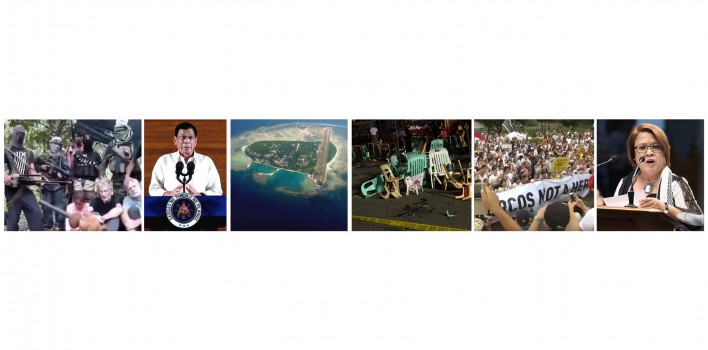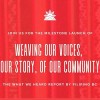Change, Shock Are Dominant Themes in 2016 PH Events
Change, Shock Are Dominant Themes in 2016 PH Events
Bangladesh Bank Heist Probe Leads to PH Casinos
In early February, a cyber attack was made on Bangladesh Bank, the central bank of the South Asian country, as hackers tried to illegally transfer US$951 million to several fictitious bank accounts around the world. The Federal Reserve Bank of New York managed to stop 30 of the 35 transactions.
The other five? Reports reveal that five of the transactions amounting to $81 million caused the money to be funneled to Manila through four fake accounts at the Rizal Commercial Banking Corp. The loot was then laundered through Manila’s loosely regulated casinos.
The Senate Blue Ribbon Committee and the Bangko Sentral ng Pilipinas (BSP), through the Anti-Money Laundering Council (AMLC), conducted a series of investigations on the heist, which ended in May. So far, the AMLC has accounted for $60 million of the stolen money. But the remaining $21 million has yet to be traced.
A Bangladesh Bank team visited Manila to recover the money and is hopeful they will get the $81 million according to Ambassador John Gomes. “The reason is I got a commitment from the president himself,” he said.
Abu Sayyaf Beheads Canadian Hostages
The Abu Sayyaf, a terror organization notorious for kidnap-for-ransom attacks, beheaded Canadian captives John Ridsdel and Robert Hall after Canada’s alleged refusal to pay the terrorists ransom money. Ridsdel was executed in April while Hall was killed two months later. The Canadians, along with Norwegian Kjartan Sekkingstad and Hall’s Filipino girlfriend, Marites Flor, were abducted at a resort in Samal Island, Davao, in September 2015.
The terrorists had initially demanded $80 million for their release.
Canadian Prime Minister Justin Trudeau condemned the brutal killings and reiterated his government’s no ransom policy. He urged other nations not to pay ransom if their citizens are abducted to discourage militants from carrying out more ransom kidnappings. Trudeau vowed to find those responsible for killing Hall and Ridsdel.
Duterte Elected President
Easily the biggest newsmaker of the year was the presidential elections, which saw a rugged Mindanaoan “underdog” turn the tables on the heavy favorites.
The tumultuous campaign was typically marked by controversies thrown at the candidates, such as Sen. Grace Poe’s status and citizenship issues, and Vice President Jejomar Binay’s corruption scandals. Sen. Miriam Defensor Santiago, because of failing health, was written off early in the game (she died later in the year). Interior and Local Government Secretary Mar Roxas, the administration candidate, bore the weight of the outgoing administration’s follies and missteps, including the alleged mishandling of typhoon Yolanda’s funds, which hounded him the rest of the way.
Rodrigo Duterte, then Mayor of Davao City, also had to grapple with issues from his checkered past. He joined the race late, but benefitted from what turned out to be a perfectly-timed and well-contrived “substitution” of another candidate, which swung the momentum in his favor late in the campaign. Campaigning on a bold anti-crime and -corruption platform, Duterte is widely believed to have benefitted from an alleged army of social media supporters and “trolls,”—aggressive cyber-campaigners and attack dogs.
Over 16 million voters catapulted the Davao City mayor to the presidency. For vice president, the tight race was won by Camarines Sur Representative Leni Robredo over closest rival Ferdinand “Bongbong” Marcos, Jr.
PH Wins Sea Dispute—or Not?
In July, the Philippines won a decisive victory over China when the Permanent Court of Arbitration upheld the country’s sovereign rights over much of the West Philippine Sea, concluding China has no legal basis to claim historic rights to the maritime region enclosed by its “nine-dash line” claim.
“The Tribunal concluded that there was no legal basis for China to claim historic rights to resources within the sea areas falling within the ‘nine-dash line,” according to a statement released to the media.
The West Philippine Sea, internally known as the South China Sea, is a resource-rich hot spot, which also hosts $5 trillion worth of shipborne trade taking place each year. No less than five countries have an active claim region, wholly or partly.
China, as expected, rejected the arbitral award, having taken no part in the proceedings and rejected the Court’s jurisdiction. On the other hand, the Philippines, which had aggressively resisted China’s claims and invested heavily in the legal battle, was subdued in its reaction, owing to the soft stance of newly elected President Rodrigo Duterte on China.
Peace Talks with Communists Resume
The Philippine government and the Communist Party of the Philippines-New People’s Army-National Democratic Front (CPP-NPA-NDF) resumed peace talks in August, hoping to hammer out a settlement to end Asia’s longest running armed struggle that has claimed thousands of lives since 1969.
The resumption of the peace negotiations in Oslo has been described as historic because it reunited Filipino Marxist leaders who assumed top positions in the CPP. Founding CPP Chairman Jose Maria Sison sat with three other guerilla leaders who, based on reports by the military, once served as party chairman: Benito Tiamzon, Allan Jasmines, and Rafael Baylosis.
“We are all here, in a foreign land, to reignite the lost sparks that were there before as both parties search for political settlement and peace. The last talks were five years ago and in all these peace efforts spanning under six presidencies, we had breakdown of talks due to preconditions,” Dureza, presidential adviser on the peace process, said.
The meeting in Oslo from August 22 to 26 was the first formal peace talk under the Duterte administration.
Blast Rocks Davao City Anew
At least 15 people were killed while 70 others were injured when an explosion rocked a crowded night market in Davao City last September 2.
President Rodrigo Duterte, who was in Davao City during the bomb attack, described the attack “as an act of terrorism, and declared the nation in a state of lawlessness,” the Philippines News Agency reported.
In October, four suspects in the bombing were arrested in Cotabato City. All are members of the Dawla Islamiya Fi Cotabato – Maute Group. The group is composed of Islamist militants linked to terrorist organizations, the Philippine Army said in a news release.
Defense Secretary Delfin Lorenzana said the group’s motive was to disrupt the government’s massive military operations in Sulu and in Central Mindanao. It was also in retaliation for the heavy casualties suffered by the Maute Group in Butig, Lanao del Sur.
The operation of the government troops in August 2016, resulted in the capture of eight Maute Group members at a checkpoint on August 22. The arrested gang members escaped prison, however, on August 27.
Hero’s Burial for Marcos Stirs Protests
Former Philippine president and dictator Ferdinand Marcos was buried with military honors at the Heroes’ Cemetery (Libingan ng mga Bayani) 30 years after he was ousted in the famous People Power Revolution. The burial, which had the tacit approval of President Duterte, took place despite strong opposition from many sectors, including the rights groups, who took to the streets to express their outrage and dismay over the sneaky burial.
“Marcos doesn’t deserve the honor because of human rights violations during his 21-year rule. This is a dark day in the nation’s history, when a tyrant, a murderer, a thief, is celebrated as a hero by a state of oligarchs and traitors,” Karapatan, a human rights group said in a statement.
Marcos had ruled the Philippines from 1965 to 1986. He led a brutal Martial Law regime from 1972-1981. Karapatan said during those years, over 60,000 people were detained, more than 30,000 tortured, and an estimated 3,000 were killed. Marcos, along with flamboyant wife Imelda and their cronies, also plundered up to $10 billion from state coffers during his rule, according to government investigators.
President Duterte said Marcos deserved to be buried at the heroes’ cemetery because he had been a president and a veteran of the second world
war. He likewise made no secret of his loyalty to the family because his father served in the Marcos government. The Marcoses are also believed to have helped fund his election campaign.
De Lima Fights Drug Charges
Senator Leila de Lima, the fiercest critic of President Rodrigo Duterte who led a Senate probe over the extrajudicial killings that has gripped the nation since Duterte waged his war on drugs, has been at the receiving end of vicious attacks from the President and his allies.
Her supposed crimes, among others: alleged protector of drug lords; alleged illicit affair with driver and bodyguard Ronnie Dayan, who supposedly collected drug money for her; alleged bank accounts with millions of pesos amassed from illegal drug trade; and at least two Senate ethics committee complaints over her links to the drug trade.
During a Senate Committee on Justice and Human Rights investigation, De Lima presented self-confessed hitman Edgar Matobato, a member of the dreaded Davao Death Squad (DDS), a vigilante group linked to then Mayor Duterte. Matobato gave a damning testimony on the DDS and Duterte’s alleged involvement, which even foreign media picked up.
A few days after, De Lima lost the Committee chairmanship following sharp disagreements with Duterte allies led by Sens. Alan Peter Cayetano. She was replaced by Sen. Richard Gordon, who breezed through the hearings and came up with a report exonerating the President and disavowing the existence of DDS.
Meanwhile, the House of Representatives Committee on Justice began investigation of the alleged multibillion-peso operation in illegal drugs inside the New Bilibid Prison (NBP) while she was justice secretary. Relying on the testimonies of convicted felons, Dayan, and later arrested fugitive and suspected drug dealer Kerwin Espinosa, the Committee submitted a report implicating De Lima in the drug trade, but stopped short of recommending her criminal prosecution.
Amid the buildup of allegations to discredit her, the senator continues to criticize President Duterte, who in turn regularly makes her the subject of his public outbursts. De Lima likewise called on the United Nations to investigate the extrajudicial killings. “Manila isn’t equipped to serve complete justice to the victims,” she said in an interview with media.
Immigration Execs Filmed Receiving Bribe Money
Two fraternity brothers of President Rodrigo Duterte and Justice Secretary Vitaliano Aguirre figured in a P50-million bribery scandal at the Bureau of Immigration (BI). Deputy Commissioners Al Argosino and Michael Robles, who both belong to the San Beda College’s Lex Talionis Fraternitas, Inc., were caught on video receiving five paper bags allegedly containing P50-million inside a Paranaque casino.
The bribe money was reportedly given in exchange for the release of 600 of the 1,300 Chinese nationals illegally working at Fontana Resort owned by gambling operator Jack Lam.
Of the P50 million, P2 million supposedly went to
retired general Wally Sombero while P18 million was given to Immigration Intelligence Chief Charles Calima Jr., another retired police general appointed by Aguirre.
Aguirre has ordered the National Bureau of Investigation to investigate the matter, and sacked Calima, purportedly to cleanse the graft-ridden office. Argosino and Robles, who earlier turned over to the justice department P30 million received from Lam, claimed innocence, saying they were there to entrap Sombero, who was working for Lam. Both were later removed by Duterte.
Lam, meanwhile, reportedly left for Hong Kong days before he was ordered arrested. He said he wants to return to the country to settle his obligations.
Text Message Removes VP Robredo from Cabinet Post
Three months after swearing in Vice President Leni Robredo as chairperson of the Housing and Urban Development Coordinating Council (HUDCC), President Rodrigo Duterte ordered her not to attend future Cabinet meetings, citing “irreconcilable differences.” The order came in the form of a text message relayed to Robredo by Cabinet Secretary Leoncio Evasco Jr.
The embattled Robredo gave up her Cabinet post on December 5, saying being barred from meetings would prevent her from performing her duties properly. However, she said resigning from the Cabinet would still allow her to “continue to support the positive initiatives of this administration and oppose those that are inimical to the people’s interest.”
Robredo said she will remain as vice president but asserted she is not eyeing the presidency. Duterte and his allies accused the vice president of being involved in a plot to unseat him.
Robredo, a member of the Liberal Party, has assailed the extrajudicial killings spawned by Duterte administration’s violent war on drugs. She also opposed the burial of the dictator Ferdinand Marcos at Libingan ng mga Bayani.
 Canada
Canada









